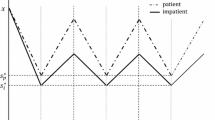Abstract
In this article we consider a two-country dynamic game model of whaling in discrete time. We assume that the countries have exact information, with one-period time delay, about each other's whaling efforts as measured by the number of vessels involved in whaling. It is shown how strategies that linearly depend on the whaling effort of the other country can be used to support a given Pareto-optimal agreement so that there will not be a temptation for unilateral deviation from the agreed decision. The credibility of these cooperative equilibrum strategies is discussed.
Similar content being viewed by others
References
Clark, C.W. (1985).Bioeconomic Modelling and Fisheries Management. New York: John Wiley and Sons.
Clemhout, S., and H. Wan, Jr. (1991). “Environmental Problem as a Common Property Resource Game. In R.P. Hämäläinen and H. Ehtamo (eds.),Dynamic Games in Economic Analysis (Lecture Notes in Control and Information Sciences, Vol. 157). New York: Springer-Verlag, pp. 132–154.
Ehtamo, H., and R.P. Hämäläinen. (1993). “A Cooperative Incentive Equilibrium for a Resource Management Problem,”Journal of Economic Dynamics and Control 17, 659–678.
Ehtamo, H., J. Ruusunen, V. Kaitala, and R.P. Hämäläinen. (1988). “Solution for a Dynamic Bargaining Problem with an Application to Resource Management,”Journal of Optimization Theory and Applications 59 (3), 391–405.
Haurie, A., and B. Tolwinski. (1990). “Cooperative Equilibria in Discounted Stochastic Sequential Games,”Journal of Optimization Theory and Applications 64 (3), 511–535.
Hämäläinen, R.P., a. Haurie, and V. Kaitala. (1985). “Equilibria and Threats in a Fishery Management Game,”Optimal Control Applications and Methods 6, 315–333.
Hämäläinen, R.P., V. Kaitala, and A. Haurie. (1984). “Bargaining on Whales: a Differential Game with Paretooptimal Equilibria,”Operations Research Letters 3, 5–11.
Munro, G.R. (1991). “Differential Games and the Optimal Management of Transboundary Fisheries. In R.P. Hämäläinen and H. Ehtamo (eds.),Dynamic Games in Economic Analysis (Lecture Notes in Control and Information Sciences, Vol. 157). New York: Springer-Verlag, pp. 95–101.
Munro, G.R., and A.D. Scott. (1985). “The Economics of Fisheries Management.” In A.V. Kneese and J.L. Sweeney (eds.),Handbook of Natural Resources and Energy Economics, Vol. 11. New York: Elsevier Science Publishers, B.V., pp. 623–674.
Osborne, D.K. (1976). “Cartel Problems,”The American Economic Review 66, 835–844.
Selten, R. (1975). “Reexamination of the Perfectness Concept for Equilibrium Points in Extensive Games,”International Journal of Game theory 4(1), 25–55.
Verkama, M., R.P. Hämäläinen, and H. Ehtamo. (1992). “Multi-Agent Interaction Processes: From Oligopoly Theory to Decentralized Artificial Intelligence,”Group Decision and Negotiation 2, 137–159.
Author information
Authors and Affiliations
Rights and permissions
About this article
Cite this article
Ehtamo, H., Hämäläinen, R.P. Credibility of linear equilibrium strategies in a discrete time fishery management game. Group Decis Negot 4, 27–37 (1995). https://doi.org/10.1007/BF01384291
Issue Date:
DOI: https://doi.org/10.1007/BF01384291




